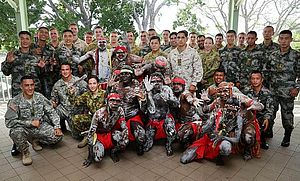This week China, Australia, and the United States began their first ever trilateral military exercise.
The exercise is taking place in the wilderness in northern Australia, and is scheduled to run through October 25. The three countries first announced that they would be holding the unprecedented military exercise back in July. At the time of that announcement, officials said that the negotiations for Exercise Kowari 14, as the exercise is called, had already been going on for months, and the exact details of the drills were still being worked out.
In a statement released at the start of the drills this week, Australia’s Defense Ministry said that ten soldiers from each one of the three countries are directly participating in the exercise, but an 100 additional Australian military personnel would be supporting the participants in some capacity.
In the same statement, Australian Defense Minister David Johnston was quoted as saying: “Exercise Kowari 14 will provide participants with an understanding of the basic principles, procedures, techniques and equipment that can enhance survival prospects in the harsh Australian environment.”
“The exercise demonstrates the willingness of Australia, China and the United States to work together in practical ways,” Australia’s defense minister added.
Even outside official statements, the trilateral exercise is being hailed by many as a significant achievement. Over at The Interpreter this week, for example, Rory Medcalf calls the exercise “a good news story in Australia’s strategic relations.” He goes on to write:
“Among other things, this exercise challenges the simplistic notion that the closer Australia gets to its U.S. ally, or indeed to Japan, the more strained and mistrustful becomes its relationship with China. It also undercuts the nonsensical view, bandied about this year by former prime minister Malcolm Fraser, that the alliance diminishes Australia’s chances of doing constructive things with Asian partners.”
In theory I have no objections to the U.S., Australia, and China holding joint exercises like the current one. However, I think such exercises start doing far more harm than good when officials and foreign policy experts from the countries involved try to ascribe significance to them which they clearly don’t warrant.
This is certainly appears to be the case Exercise Kowari, which, as a reminder, comprises of a couple dozen soldiers from the U.S., Chinese, and Australian militaries learning survival techniques in the rugged wilderness of northern Australia. According to Xinhua, some of the actual skills they will be learning over the next two weeks are “how to find food in the rugged countryside and also identify[ing] which plants can be used for emergency medicine.”
This is hardly three militaries strengthening their interoperability in “practical” ways, as the Australian defense minister’s statement seemed to suggest. It is impossible to conceive of any remotely realistic situation in which a group of Chinese, Australian, and American soldiers would find themselves trying to survive together in the rugged countryside of northern Australia.
Which is fine. The exercise was clearly devised by political leaders as a PR stunt intended to convey the message that their three countries — and more specifically their militaries — view each other as genuine partners. As a PR stunt, it was clearly ill-devised in that it sent the exact opposite message as intended. The three sides spent months trying to negotiate a military exercise to create the impression that they view each other as partners, and yet all they could ultimately agree to was a three-week survival course. That alone underlines just how extensive the distrust between them really is.
That is an important thing to know, which makes the exercise valuable and worthwhile, so long as everyone takes away the right lessons.

































